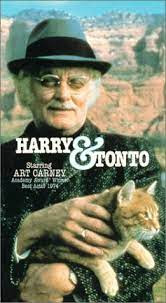Hard to believe that Art Carney, best known for playing Ralph Kramden’s blue-collar buddy on TV’s The Honeymooners, beat out some of Hollywood’s finest for the Best Actor Oscar of 1975. His competition? Jack Nicholson for Chinatown, Al Pacino for The Godfather, Part II, and such also-rans as Dustin Hoffman (playing Lenny Bruce) and Albert Finney (as Hercule Poirot in Murder on the Orient Express). Roman Polanski’s Chinatown nabbed eleven Oscar nominations that year, though it won only for Robert Towne’s scintillating screenplay. It had the misfortune of being up against Francis Ford Coppola’s Godfather sequel, which won five statuettes, including Best Picture, out of a possible eleven. By contrast, Carney’s Harry and Tonto was nominated only for its original screenplay and for Carney’s performance.
The win for Carney came as a surprise to many, including my former boss Roger Corman, who was reveling in the fact that so many of his B-movie alumni (including Nicholson, Coppola, and Towne) were nominees that year. He was quoted as joking that Nicholson’s loss had spoiled his personal sweep. It’s certainly possible that Nicholson and Pacino, both playing intensely dramatic roles, cancelled each other out in the voting. But Carney’s victory also indicates the Academy’s affection for the fifty-plus-year-old veteran, despite the rise of a generation of Young Turks.
As a film, Harry and Tonto isn’t much. Directed and co-written by Paul Mazursky, it’s one of his typically modest offerings (see also Bob & Carol & Ted & Alice, An Unmarried Woman, and Moscow on the Hudson) that take up a timely topic and treat it in a low-key manner. In Harry and Tonto, the subject is the plight of the elderly. Harry, a rather dapper retired schoolteacher whose wife died years before, is being thrown out of his New York apartment because the building is being “improved” into a parking lot. With his ginger cat in tow, he is taken in by a son in the suburbs, but is well aware he's disrupting a family already near its breaking point. The bulk of the film is his odyssey first to Chicago (and a daughter with whom he can’t help sparring) and then to Los Angeles (where his youngest son is overtly needy). There are interesting stops along the way, including a visit to a first love now in the throes of dementia, and he connects while on the road with some colorful characters, like the good-hearted fifteen-year-old runaway played by Melanie Mayron. But basically the film is on Carney’s shoulders. By the end of Harry and Tonto, we know him well: his gruffness, his surprising erudition, his quiet live-and-let-live generosity of spirit, his overriding desire not to be beholden to the younger generation.
It’s not a long movie, but it IS a slow one, and some critics have complained about its pacing. Personally, I admit to getting restless . . . but it was worth it to see (pleasant surprise!) Harry finally find happiness on his own terms. I had dreaded watching a film in which the elderly are made to look both creaky and cute, and I’m happy that Harry is portrayed as very much his own man, still smart, and without a shred of self-pity. Stand-outs in a stellar cast include Ellen Burstyn as Harry’s daughter (she won her own Oscar in 1975 for Alice Doesn’t Live Here Anymore) and Larry Hagman as his younger son. I particularly liked Chief Dan George, as a philosophical Native American whom Harry meets in jail.
And then there’s Tonto the cat, who fittingly won the Patsy Award as the year’s best animal actor.


No comments:
Post a Comment